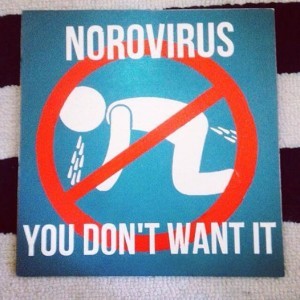The amount of norovirus-related news is overwhelming this week. A college in Virginia was closed. A cruise ship returned to port. Outbreaks at Minnesota and U.K. elementary schools.
And, maybe, possibly, an outbreak at N.C. State associated with a fraternity and sorority.
According to The Technician, there are up to 20 students experiencing nasty gastrointestinal illness symptoms following a social function between chapters of the Alpha Delta Pi sorority and the Kappa Alpha Order fraternity.
Fred Hartman, the director of public relations at NC State, said the students are exhibiting symptoms that are consistent with the stomach flu, including nausea, vomiting and diarrhea.
The sorority hosted an event Sunday night, and the university became aware that students had developed stomach ailments by Monday night, according to Hartman. No new cases were reported as of 5 p.m. Wednedsay.
The severity of the symptoms varied on a case-to-case basis, and many of the students sought treatment off campus.
The Student Health Center posted a notification to its website indicating the stomach flu had appeared on NC State’s campus on Tuesday (what is stomach flu? -ben). According to the post, symptoms of the virus (the stomach flu virus? -ben) include nausea, vomiting, diarrhea, abdominal pain/cramping, fever and/or headaches.
The virus is spread by touching contaminated surfaces before touching the mouth, consuming contaminated foods and drinks and coming in direct contact with the stool or vomit of an infected person, according to the post.
Brian Peters, the community director of the Honors Village, made a post in the NCSU Quad/Honors Village Facebook page indicating that there are reports of gastrointestinal illness going around campus, particularly in the Greek community, that is “potentially norovirus.”
Although the word norovirus never appeared in the post from the Student Health Center, the URL link to the page is: healthcenter.ncsu.edu/2015/02/norovirus-campus/.
Leah Arnett, the director of Student Health Services at NC State, deferred comments about the stomach flu outbreak to University Communications.
Justin Hammond, the director of marketing and communications in the office of the Vice Chancellor and Dean of Academic and Student Affairs, said in an email that University Communications is handling all inquiries on this information and deferred comment to Hartman.
Laine Gladstone, the president of NC State’s chapter of AD Pi also declined to comment.
Michael Wallace, the president of NC State’s chapter of Kappa Alpha Order, did not respond to multiple requests for comment by press time.
The Office of Greek Life declined to comment about the situation.
“The university is taking steps to try and help those students and to try and prevent the illness from spreading,” Hartman said.
Encouraging handwashing is a great message. If this outbreak is suspected to be norovirus, based on exposure/symptom timing and other factors, other good messages include: talking about the limitation of popular alcohol-based hand sanitizers (they don’t do much against the non-enveloped virus); keeping ill folks away from food preparation; the limitation of quaternary ammonia-based sanitizers (only chlorine is really effective); and, that the spread potential from a vomit event is about a 25 radius.
Norovirus is kind of special.
 A guest at one of the Russell and Prince Regent Hotels on the Esplanade, which are next door to each other and both owned by the holiday chain Daish’s, contracted norovirus and the bug then went on to affect several guests.
A guest at one of the Russell and Prince Regent Hotels on the Esplanade, which are next door to each other and both owned by the holiday chain Daish’s, contracted norovirus and the bug then went on to affect several guests.









